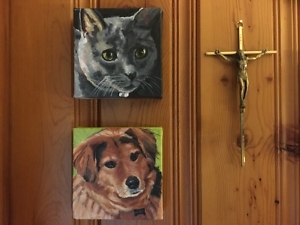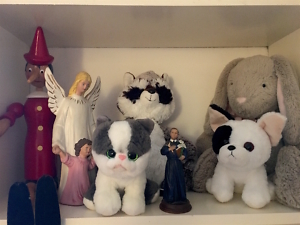St. Jeter the Kitty Cat, Pray for Us
Sometimes transcendence comes during a marathon of potty breaks and toddler demands
When it’s my turn to put my 3-year-old twin daughters down to sleep, the order of the night goes like this: the reading of three books, each chosen by one of us; the singing of two songs; the saying of prayers; and then elaborate gestures involving my being a gentleman and kissing their hands and stealing their noses.
 There are also multiple trips to the potty, calls for one more sip of water (“No, not that cup! The blue one!”), and proclamations to “Watch this, Daddy!” while someone jumps off the bed onto a beanbag, accuses the other one of hitting them, accuses me of not actually reading the book I just finished, and various other versions of anarchy and bedtime treason. And then there are the demands: Put the ceiling fan on. Rock me. Don’t leave me. Leave the door open a little bit. I want Mommy.
There are also multiple trips to the potty, calls for one more sip of water (“No, not that cup! The blue one!”), and proclamations to “Watch this, Daddy!” while someone jumps off the bed onto a beanbag, accuses the other one of hitting them, accuses me of not actually reading the book I just finished, and various other versions of anarchy and bedtime treason. And then there are the demands: Put the ceiling fan on. Rock me. Don’t leave me. Leave the door open a little bit. I want Mommy.
Prayer time, for a while now, has involved a Hail Mary, an Our Father, a reflection on the ways we have felt God’s presence in our lives today (basically a modified version of St. Ignatius Loyola’s Examen reflection), an additional Hail Mary for those people in our lives who need a little extra prayer from us today, and then the reciting of the Litany of Saints. Our personal Litany has been fairly consistent from the time they were only months old. It includes St. Gerard, St. Padre Pio, St. Francis, St. Anthony, St. Ignatius, St. Frances Xavier Cabrini, St. John Baptist de La Salle, St. Mary, St. Anne, St. Cecilia, St. Teresa, and St. Joseph. We finish with ”Pray for us,” as one should.
Not long ago, one of my daughters interrupted me after St. Anthony and before St. Ignatius.
“Jeter the Kitty Cat,” she said.
“You want me to include Jeter the Kitty Cat?” I asked.
“Yeah,” she said.
“St. Jeter the Kitty Cat?” I clarified.
“Yeah.”
“Ok. St. Jeter the Kitty Cat, St. Ignatius, St. Frances Xavier Cabrini…”
I didn’t miss a beat. I understand why she added Jeter. Before we begin our recitation of the Litany, I say, “And now we say a prayer to all the angels and the saints in heaven who watch over us and intercede on our behalf.”
Jeter — named for the famed Yankees shortstop — was our beloved 20-year-old-cat who had died just a week earlier. He went to the doctor and never came home. My wife and I told our daughters, as you might tell 3-year-olds, that Jeter had gone to heaven. It made sense that Jeter would now be joining all those other saints in heaven, even if my daughters have no idea who those other people are. Jeter was now an official member of the Litany.
A few months after Jeter died, we added a new member to the Litany: Bridget the Honey’s dog. Bridget belonged to my mother-in-law, whom my daughters affectionately call Honey. She was also beloved and old, went to the doctor, never came home, and was now in heaven. Welcome to the Litany, Bridget.
My daughters know what dead means, at least in terms of the general concept of something not being alive anymore. We were walking around our Nashville neighborhood recently and came across a dead squirrel in the street that we couldn’t avoid. There was genuine compassion and sorrow in their voices when they said, “Oh no, it’s dead.” The heat of the summer had led to the frequent appearance of dead and dried up worms on our patio, as well. After announcing that the worms were dead, one of my daughters would often pick them up and throw them on the grass. I consider that a thoughtful gesture.
 We could have said Jeter or Bridget had died, which is true and probably the right thing to do in order to introduce the girls to certain realities of life. But we also know that all dogs and cats go to heaven, and not because some 1989 animated movie told us so. Could we have said Jeter and Bridget died and went to heaven? Probably, but that might have opened up a can of worms, literally, getting into heaven. A can of squirrels, too. And then we’d never get to bed.
We could have said Jeter or Bridget had died, which is true and probably the right thing to do in order to introduce the girls to certain realities of life. But we also know that all dogs and cats go to heaven, and not because some 1989 animated movie told us so. Could we have said Jeter and Bridget died and went to heaven? Probably, but that might have opened up a can of worms, literally, getting into heaven. A can of squirrels, too. And then we’d never get to bed.
All of the Saints in our Litany are there for a reason. My wife and I prayed to St. Anne when we were trying to conceive and to St. Gerard when my wife was pregnant. I had a prayer card to St. Gerard, given to us by Holy Rosary Church’s Blessed Beginnings ministry, in my pocket in the delivery room when my daughters were born. I was introduced to Padre Pio, before he was St. Pio, by relatives in Southern Italy while visiting there with my father in 2000. St. Francis, the patron saint of animals, was my favorite saint as a child, so much so that I took his name for my confirmation. St. Cabrini is the patron saint of Italian Americans and all immigrants. St. John Baptist de La Salle and St. Ignatius founded the orders that taught me in high school and college. St. Cecilia and St. Teresa are my daughters’ namesakes. St. Anthony, whom my wife calls upon often on my behalf, is the patron saint of lost things. St. Mary and St. Joseph need no introduction.
All are inspirations, sources of strength, and examples of how to live our lives. Together, they offer an opportunity for transcendence. And sometimes transcendence is exactly the thing you need during a marathon of potty breaks and toddler demands and the fear that you might never, ever go to sleep again, and yet still have to go to work in the morning.
One of the things about Catholicism that I have always loved is the communion of saints, this idea that we are connected to those individuals, in many cases ordinary people who did extraordinary things, in a literal and visceral way. We are never truly alone.
Which makes my daughter’s insertion of Jeter into the Litany, right there alongside the patron saints of animals and lost things, so perfect. He’s still with us.
There are certain things in life that are inevitable, which means that over time, the Litany will likely get longer. If the tradition continues for my daughters, well into their adulthood, it’s very possible that I, should they choose to promote me, may make the Litany myself.
There is plenty of time before then, though. For now, I’m content to work on being a living saint: the patron saint of infinite patience and endless trips to the potty.
Coda
Almost six months after this essay was completed, life in Nashville changed when a series of tornadoes ripped through Middle Tennessee, including my neighborhood in Donelson. Our house was spared from the “tormato” (as my daughters called it), but many homes and businesses and lives were not. We added an extra Hail Mary during prayer time for those whose lives were affected by the storms, especially those whose “houses were broken” (again, my daughters’ words).
Life in Nashville, and the world, then changed again as the onset of the coronavirus global pandemic shut the city and the world down. We are all social distancing and self-quarantining. My daughters and I now say yet another an extra Hail Mary for all of those affected by the virus, for those families who have lost loved ones, and for all those struggling in any way through these difficult and uncertain times.
It’s in this environment that another soul entered our Litany of Saints. Hobo, our beloved 15-year-old Australian Shepherd-Chow mix, whom my wife rescued when he was 2 years old, left us late on a Sunday night at the end of March. He had a mass on his spleen, discovered back in the fall, and as the months passed, his health and quality of life began to fail.
Euthanasia when the world is normal is painful and difficult. In the age of coronavirus, it is strange. And awkward. Veterinary clinics, like many essential services, have adjusted their procedures to keep doctors and technicians and the families of pets safe from infection. Human interaction, in the case of routine check-ups and procedures, is kept at a minimum. Euthanasia, however, requires a compassion that only human connection can provide.
And so it was that the doctor who had consulted with us from 6 feet away in the parking lot, while we sat in our car and talked with him through the window, was in the same room with us, on the floor, inches away, as we hugged and cried and petted and said goodbye to Hobo. The intimacy and the beauty of that moment were not lost on me, and yet I couldn’t hug the doctor or even shake his hand. I could only look him in the eyes — though my own blurry eyes — and hope he understood our gratitude at being able, in that moment, to be that close.
Angels walk among us. St. Hobo the Mommy’s Dog, pray for us.

Copyright (c) 2020 by Joe Pagetta. All rights reserved. Born and raised in Jersey City, New Jersey, Joe Pagetta is a Nashville museum communications professional, personal essayist, and arts writer whose work has appeared in America, Wordpeace, Nashville Scene, PBS.org, Nashville Arts, My Modern Met, and Ovunque Siamo. Guinea Bastard, a collection of his personal essays, was published in 2018.


